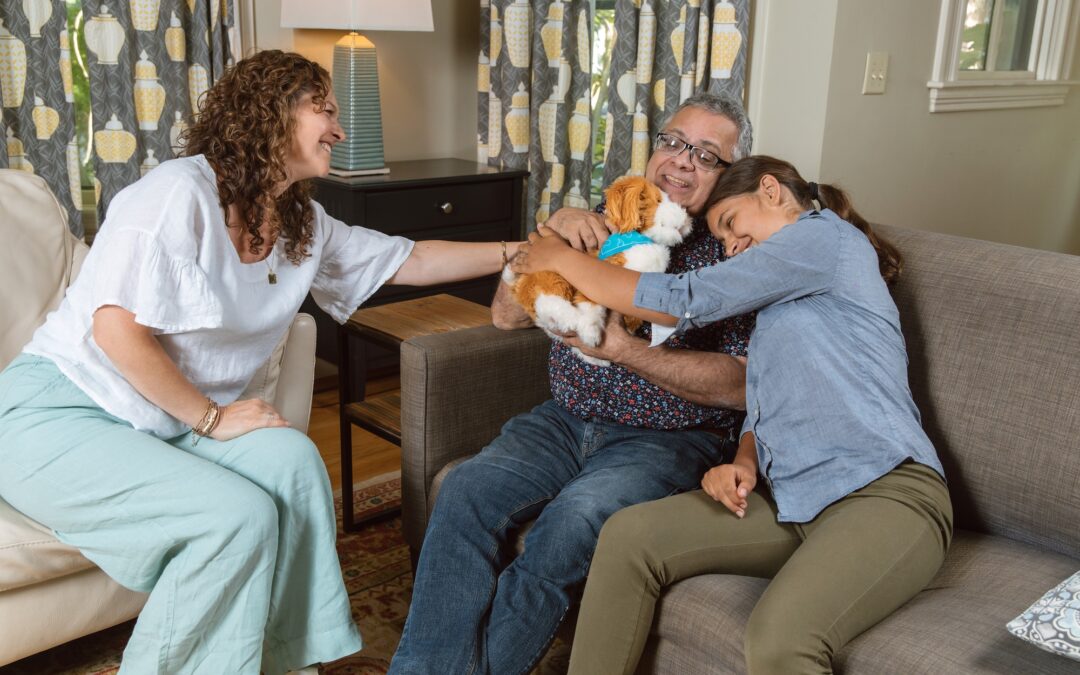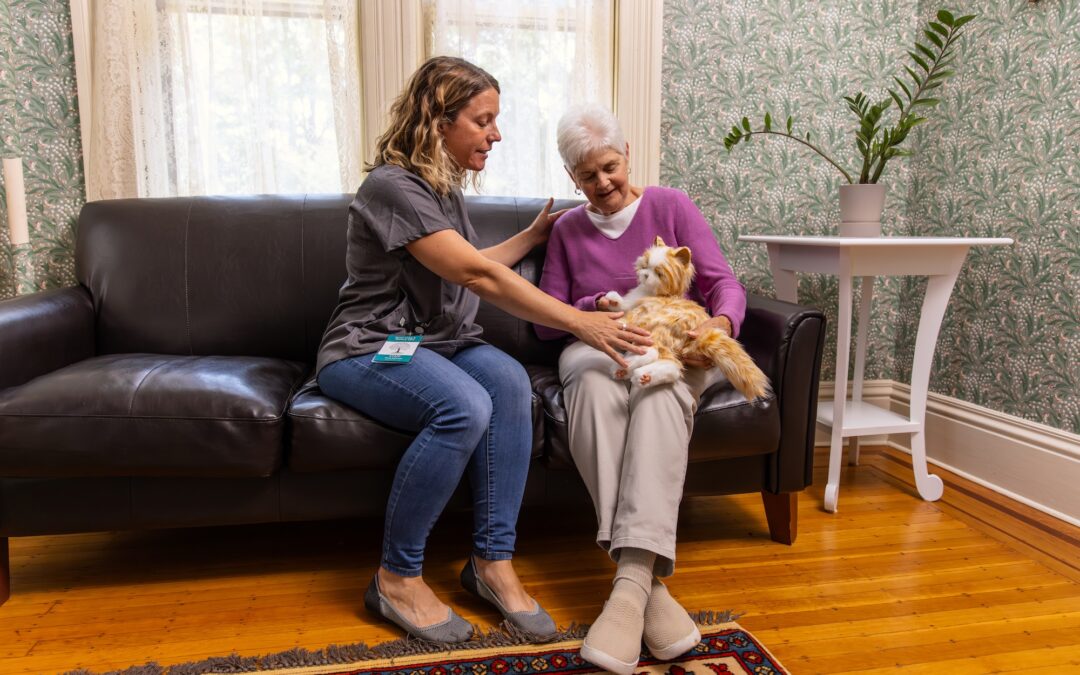
Aug 24, 2022 | Research
Abstract
Background
Robot pets may assist in the challenges of supporting an aging population with growing dementia prevalence. Prior work has focused on the impacts of the robot seal Paro on older adult well-being, but recent studies have suggested the good acceptability and implementation feasibility of more affordable devices (Joy for All [JfA] cats and dogs).
Objective
We aimed to address the limited effectiveness research on JfA devices.
Methods
We conducted an 8-month, stratified, cluster randomized controlled trial in 8 care homes in Cornwall, United Kingdom. Over 4 months, 4 care homes each received 2 JfA devices (1 cat and 1 dog; intervention group), and 4 homes received care as usual (control group).
Psychometrics were collected before and after the intervention to compare the change from baseline to follow-up between the groups. In the final 4 months, all 8 care homes received devices, but only qualitative data were collected owing to COVID-19 and reduced capacity. The primary outcome was neuropsychiatric symptoms (Neuropsychiatric Inventory [NPI] Nursing Home version). Care provider burden was a secondary outcome (occupational disruptiveness NPI subscale), alongside the Challenging Behavior scale, the Holden communication scale, the Campaign to End Loneliness questionnaire, and medication use.
Qualitative data were collected through care staff observation calendars and end-of-study interviews to understand use, experience, and impact. We also collected demographic data and assessed dementia severity. In total, 253 residents had robot interaction opportunities, and 83 were consented for direct data collection.
Results
There was a significant difference in the total change from baseline to follow-up between the intervention and control groups for NPI (P<.001) and occupational disruptiveness (P=.03). Neuropsychiatric symptoms increased in the control group and decreased in the intervention group. No significant difference was seen for communication issues or challenging behavior. For NPI subdomains, there were significant differences from baseline to follow-up in delusions (P=.03), depression (P=.01), anxiety (P=.001), elation (P=.02), and apathy (P=.009), all of which decreased in the intervention group and increased slightly in the control group. The summative impact results suggested that most residents (46/54, 85%) who interacted with robots experienced a positive impact. Those who interacted had significantly higher dementia severity scores (P=.001). The qualitative results suggested good adoption, acceptability, and suitability for subjectively lonely individuals and lack of a novelty effect through sustained use, and demonstrated that the reasons for use were entertainment, anxiety, and agitation.
Conclusions
Affordable robot pets hold potential for improving the well-being of care home residents and people with dementia, including reducing neuropsychiatric symptoms and occupational disruptiveness. This work suggests no novelty effect and contributes toward understanding robot pet suitability. Moreover, interactions were more common among residents with more moderate/severe dementia and those subjectively lonely.
Read the study

Mar 9, 2022 | Research
Categories
- Reduce Social Isolation
- Reduce Feelings of Loneliness
- Reduce Use of Antipsychotics and other Medications
- Increased Quality of Life
- Others: Decreased Agitation; Increased Cooperation with Activities of Daily Living
Organization Name
Alacare Home Health and Hospice
Organization Type
Home Health and Hospice
Organization Description
Alacare is Alabama’s oldest and largest family-owned home health care
agency. Since 1970, Alacare has provided patients with quality home
healthcare including hospice/palliative care and rehabilitation services.
Project Description
Alacare has long recognized the value of pet assisted visits and therapies
with home bound patients, but the liability risks for incorporating live pets
into our patient-centered care provisions has stifled the prospects for the
inclusion of 4-legged volunteers into our programs.
Providentially, John Beard, President of Alacare Home Health and Hospice,
discovered the animated, robotic Joy For All Companion Pets. Under his
guidance and leadership, Alacare developed and completed a Companion
Pet Pilot Study in 2018. Hospice patients experiencing anxiety due to
advancing dementia and other patients perceived at risk for social isolation
were considered for participation in the study.
Read the study

Nov 1, 2021 | Research
Abstract
Background
Globally, pressure is increasing on health and social care resources due to the aging population and growing prevalence of dementia. Companion robots, such as Paro, demonstrate strong potential for helping reduce this pressure through reported benefits including reduced agitation, depression, loneliness, care provider burden, and medication use.
However, we previously identified that user-centered design of robot pets is both essential and understudied. We observed that commonly used robot pets are poorly matched to end-user requirements, and that end users and developers of robot pets differ significantly in their perception of appropriate design. This may explain some of the contradictory outcome research and variance in results for robot pets, such as Paro.
Objective
In response to the literature gap, we aimed to provide user-centered insights into the design of robot pets from key stakeholders to inform future robot development and the choice of robots for real-world implementation and research. We focused on understanding user requirements.
Methods
We conducted a qualitative study with 65 participants from 5 care homes (26 care home residents, 29 staff members. and 10 family members). Care home residents formed groups of between 3 and 4 individuals and experienced free interactions with a range of 8 companion robots and toys, including Paro and more affordable alternatives.
The robots provided had a range of esthetics, shell types, interactivity levels, and designs for comparison. Care staff and family members observed the interactions. All participants then engaged in focus groups within their stakeholder category to discuss preferences and user requirements in companion robot design. Both free interactions and focus groups were video and audio recorded, transcribed, and subjected to thematic analysis.
Results
Care home residents, family members, and staff were open and accepting of the use of companion robot pets, with the majority suggesting that they would keep a device for themselves or the residents.
The most preferred device was the Joy for All cat, followed by the Joy for All dog. In discussions, the preferred design features included familiar animal embodiment (domestic pet), soft fur, interactivity, big appealing eyes, simulated breathing, and movements. Unfamiliar devices were more often seen as toy-like and suitable for children, producing some negative responses.
Conclusions
This work provides important and user-centered insights into future robot designs for care home residents by means of a comprehensive comparison with key stakeholders. This work strongly supports the use of familiar embodiment in future robot pet designs, with domestic cat and dog morphologies appearing most acceptable. The results have implications for future robot designs and the selection of robot pets for both research and real-world implementations.
Read the study

Sep 23, 2019 | Research
Abstract
Background
Studies consistently demonstrate that older adults who are lonely have higher rates of depression and increased mortality risk. Pet ownership may be a solution for loneliness; however, challenges related to pet ownership exist for older adults. Therefore, researchers and practitioners are examining the use of animatronic pets to reduce loneliness.
Objective
To determine the feasibility of an animatronic pet program, and whether ownership of animatronic pets would decrease loneliness and improve well-being among lonely older adults.
Methods
Eligible individuals were identified as lonely through a prior survey. Participants were provided with the choice of an animatronic pet and completed T1/T2/T3 surveys.
Results
Attrition was high; 168 (63%) participants completed T1/T2 surveys, and 125 (48%) also completed a T3 survey. Post survey data indicated that loneliness decreased, while mental well-being, resilience, and purpose in life improved. Frequent interactions with the pets were associated with greater improvement in mental well-being and optimism.
Conclusions
Animatronic pets appear to provide benefits for the well-being of lonely older adults. Future studies should employ randomized controlled designs examining the impact of animatronic pets.
Read the study

Feb 9, 2019 | Research
Delirium is highly prevalent in hospitalized patients and is a strong and consistent negative predictor of length of stay, mortality, and long-term cognitive outcomes.
Symptoms commonly associated with delirium include reduced ability to focus, sleep disturbances, psychomotor agitation, and emotional disturbances. The management of the behavioral disturbances of delirium is challenging. Although non-pharmacologic means to reduce the duration or severity of delirium are advocated, there are limited established therapies beyond early physical mobilization, reorientation, attempting to enhance natural sleep patterns, and bedside sitting.
Recently, the use of robotic pets has been reported to be helpful in reducing agitation in nursing home patients with dementia.
Given that dementia is a major risk factor for delirium, it is reasonable to speculate whether such devices could be useful in a hospital setting. To this end, we initiated a pilot study to assess the feasibility of using robotic pets as a non-pharmacologic behavioral intervention for intensive care unit (ICU) patients with delirium.
We recruited 20 subjects with ICU delirium, at our hospital, from July 2017 to December 2017. The institutional review board approved the study. Delirium was confirmed using the Confusion Assessment Method for the ICU scale.
After written informed consent was obtained from the subject’s proxy, the subject received a new “Joy for All” robotic cat (Hasbro, Pawtucket, RI). The cat is battery-operated and can purr, meow, and react to touch. The family and bedside nurse were encouraged to use the cat with the subject (Figure). At 3 days post-enrollment, the subject (if able) and family (if available) were asked to complete a 5-question survey and to provide unstructured feedback. The same survey was e-mailed to all ICU nurses, support staff, and clinicians (n ∼ 400). Survey questions were graded on a 5-point Likert scale (from 1 [“strongly disagree”] to 5 [“strongly agree”]). Twenty-three surveys were returned from subjects and their families, and 70 were returned from ICU support staff.
Read the study

Feb 9, 2018 | Research
This randomized controlled trial at an inner city community hospital examined the effect of a robotic pet (cat or dog) on cognition, loneliness, depression, delirium, falls, restraint use, and 1:1 companion use in 160 adults over age 65. The study utilized robotic pets which have an audible heartbeat and interact by purring or barking, turning their heads, opening/closing their eyes, snuggling, wagging their tails, moving their paws, and showing their bellies.
Read the study






